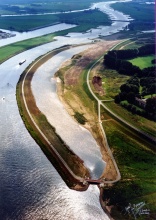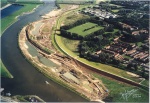Case study:Bakenhof Dyke reconstruction: Difference between revisions
No edit summary |
No edit summary |
||
| (6 intermediate revisions by one other user not shown) | |||
| Line 19: | Line 19: | ||
The channel capacity has increased to allow for significant changes in flow. There has been little effect on biological quality with regard to Water Framework Directive targets, as fish and benthic invertebrates were not monitored before the works were carried out. | The channel capacity has increased to allow for significant changes in flow. There has been little effect on biological quality with regard to Water Framework Directive targets, as fish and benthic invertebrates were not monitored before the works were carried out. | ||
}} | }} | ||
{{Image gallery}} | |||
{{Case study image | |||
|File name=Luchtfoto BA 010827.jpg | |||
|Caption=During construction | |||
}} | |||
{{Image gallery end}} | |||
{{Toggle button}} | |||
{{Toggle content start}} | |||
{{Case study subcatchment | {{Case study subcatchment | ||
|Subcatchment=Rhine | |Subcatchment=Rhine | ||
}} | }} | ||
{{Site}} | {{Site | ||
{{Project background}} | |Name=Bakenhof | ||
{{Motivations}} | |Heavily modified water body=No | ||
{{Measures}} | |Protected species present=No | ||
|Invasive species present=No | |||
}} | |||
{{Project background | |||
|Reach length directly affected=1500 | |||
|Project started=2001 | |||
|Project completed=2004/01/01 | |||
}} | |||
{{Motivations | |||
|Specific mitigation=Urbanisation, | |||
}} | |||
{{Measures | |||
|Bank and bed modifications measure=creation of secondary channel | |||
|Floodplain / River corridor=Creation of backwaters, | |||
}} | |||
{{Hydromorphological quality elements header}} | {{Hydromorphological quality elements header}} | ||
{{End table}} | {{End table}} | ||
| Line 36: | Line 58: | ||
{{Monitoring documents}} | {{Monitoring documents}} | ||
{{Monitoring documents end}} | {{Monitoring documents end}} | ||
{{Additional Documents}} | {{Additional Documents}} | ||
{{Additional Documents end}} | {{Additional Documents end}} | ||
| Line 43: | Line 63: | ||
{{Additional links and references footer}} | {{Additional links and references footer}} | ||
{{Supplementary Information}} | {{Supplementary Information}} | ||
{{Toggle content end}} | |||
Latest revision as of 06:37, 6 September 2013
Project overview
| Status | Complete |
|---|---|
| Project web site | |
| Themes | Flood risk management, Habitat and biodiversity |
| Country | Netherlands |
| Main contact forename | Nick |
| Main contact surname | Elbourne |
| Main contact user ID | User:NickRRC |
| Contact organisation | River Restoration Centre |
| Contact organisation web site | |
| Partner organisations | |
| Parent multi-site project | |
| This is a parent project encompassing the following projects |
No |
Project summary
Dike realignment took place utilising an area of former brickwork factory. The floodplain was widened by 200 meters and a new secondary channel created. The works also improved habitat connections, by increasing vegetation in the floodplain which will mature over time. The site is now popular for recreation, specifically for water sports, with Arnhem residents.
The channel capacity has increased to allow for significant changes in flow. There has been little effect on biological quality with regard to Water Framework Directive targets, as fish and benthic invertebrates were not monitored before the works were carried out.
Monitoring surveys and results
Lessons learnt
Image gallery
|
Catchment and subcatchmentSelect a catchment/subcatchment
Catchment
Subcatchment
Other case studies in this subcatchment: Amerongse Bovenpolder, Blauwe Kamer, Room for the River, Ruppoldingen, Upper Main catchment restoration
Site
Project background
Cost for project phases
Reasons for river restoration
Measures
MonitoringHydromorphological quality elements
Biological quality elements
Physico-chemical quality elements
Any other monitoring, e.g. social, economic
Monitoring documents
Additional documents and videos
Additional links and references
Supplementary InformationEdit Supplementary Information
| ||||||||||||||||||||||||||||||||||||||||||||||||||||||||||||||||||||||||||||||||||||||||||||||||||||||||||||||||||||||||||||||||||||||||||||||||||||||||||||||||||||||||||||||||||||||||||||||||||||||||


